英语(2019)人教版选择性必修第三册Unit 3 Environmental protection Grammar 课件(28张ppt)
文档属性
| 名称 | 英语(2019)人教版选择性必修第三册Unit 3 Environmental protection Grammar 课件(28张ppt) |
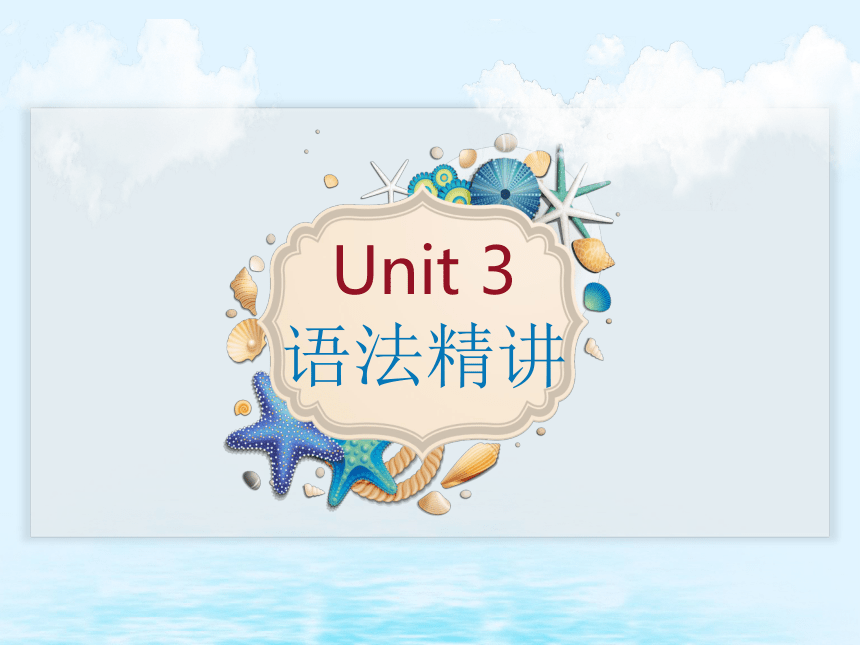
|
|
| 格式 | zip | ||
| 文件大小 | 665.7KB | ||
| 资源类型 | 教案 | ||
| 版本资源 | 人教版(2019) | ||
| 科目 | 英语 | ||
| 更新时间 | 2022-08-30 11:48:41 | ||
图片预览

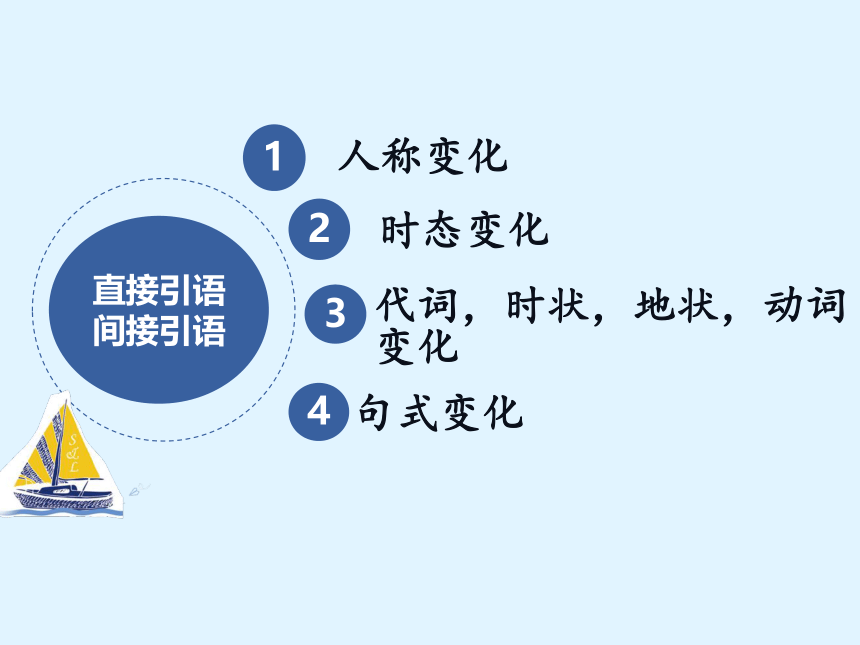
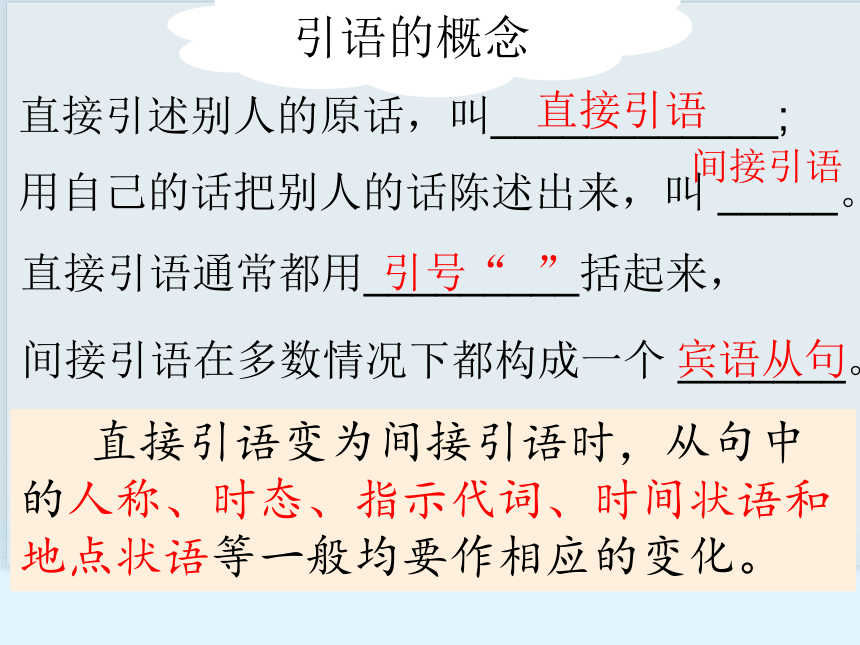
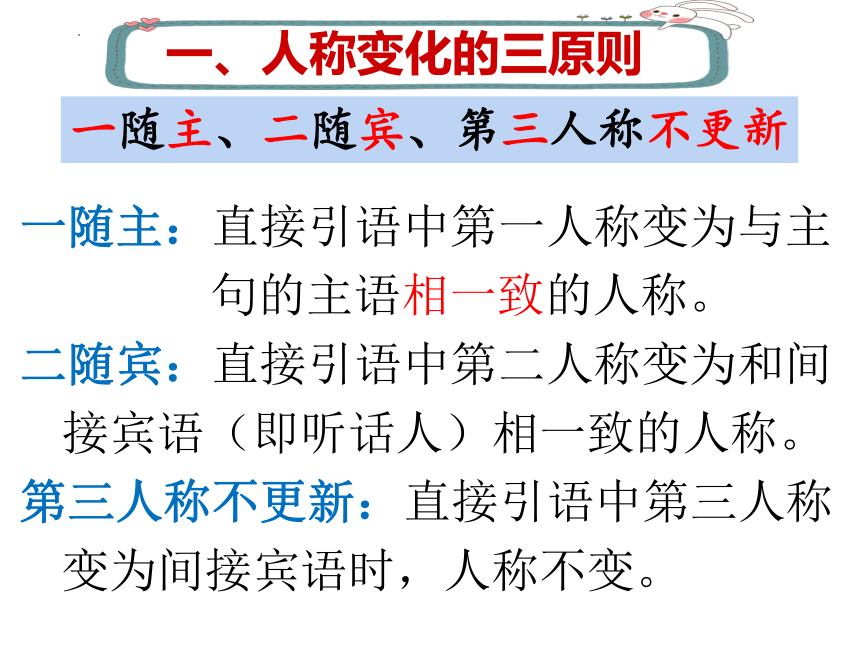
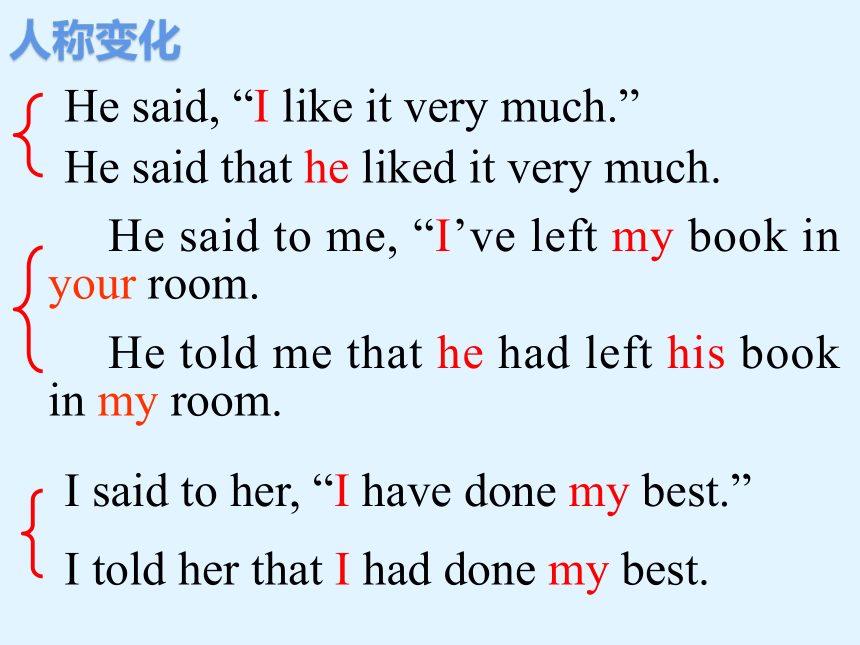
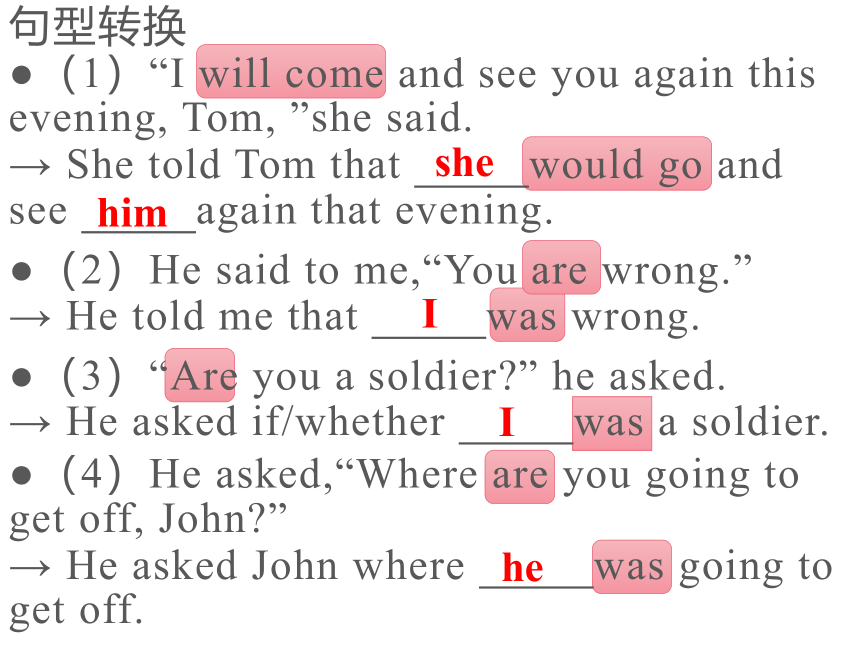
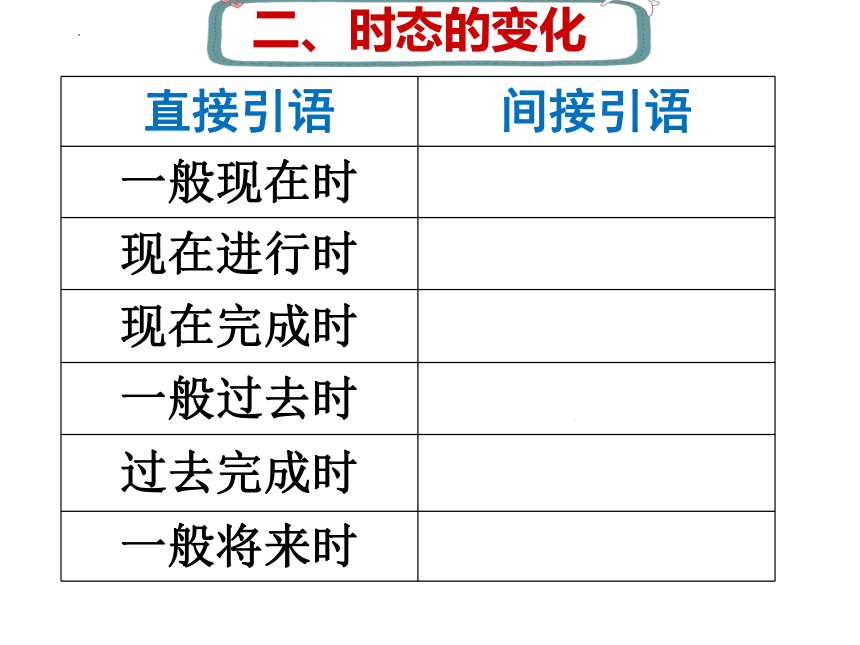
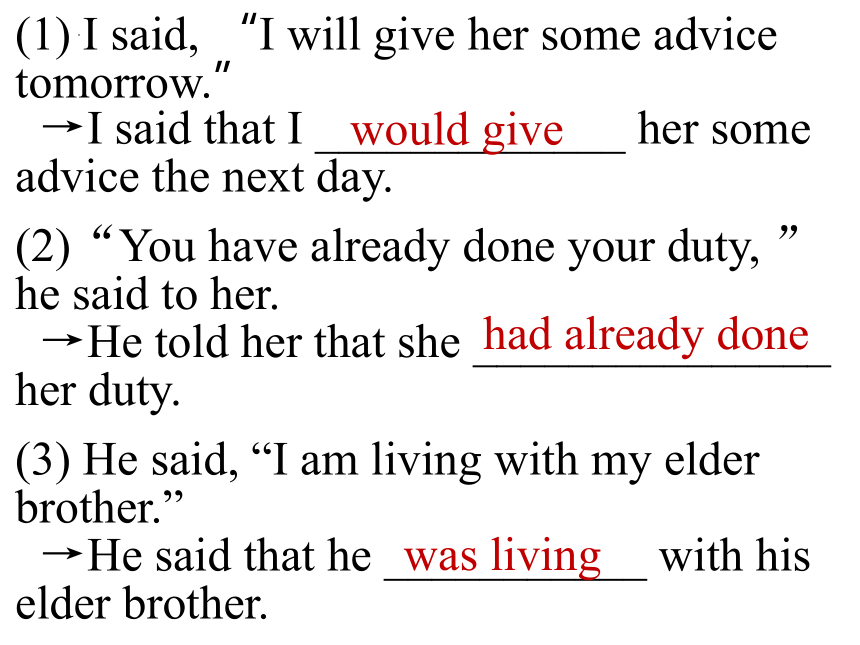
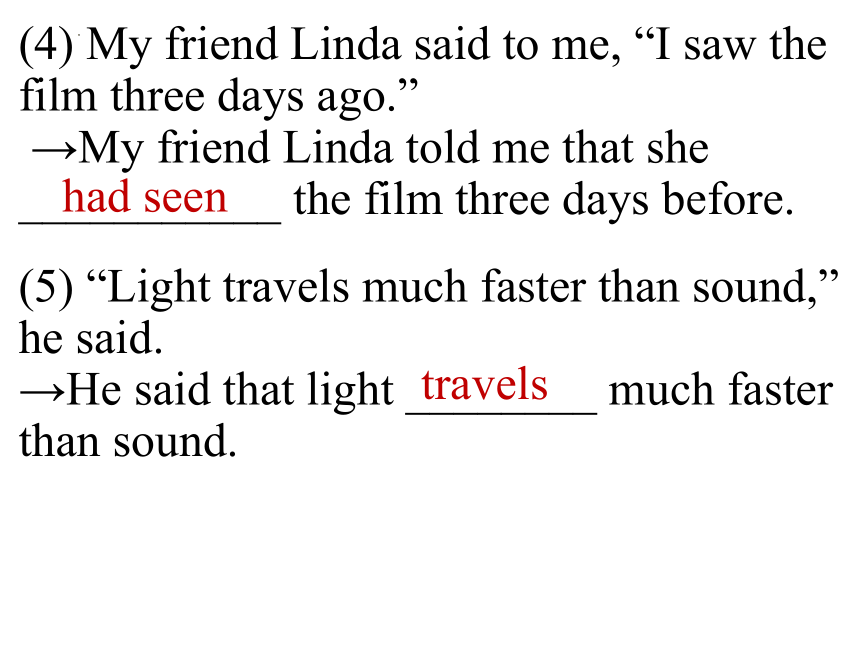
文档简介
(共28张PPT)
Unit 3
语法精讲
直接引语
间接引语
人称变化
时态变化
1
2
代词,时状,地状,动词变化
3
句式变化
4
引语的概念
直接引述别人的原话,叫____________;
直接引语
用自己的话把别人的话陈述出来,叫 _____。
间接引语
直接引语通常都用_________括起来,
引号“ ”
间接引语在多数情况下都构成一个 _______。
宾语从句
直接引语变为间接引语时,从句中的人称、时态、指示代词、时间状语和地点状语等一般均要作相应的变化。
一、人称变化的三原则
一随主、二随宾、第三人称不更新
一随主:直接引语中第一人称变为与主
句的主语相一致的人称。
二随宾:直接引语中第二人称变为和间接宾语(即听话人)相一致的人称。
第三人称不更新:直接引语中第三人称变为间接宾语时,人称不变。
He said, “I like it very much.”
He said that he liked it very much.
He said to me, “I’ve left my book in your room.
He told me that he had left his book in my room.
I said to her, “I have done my best.”
I told her that I had done my best.
人称变化
she
I
him
I
he
句型转换
(1)“I will come and see you again this evening, Tom, ”she said.
→ She told Tom that would go and see again that evening.
(2)He said to me,“You are wrong.”
→ He told me that was wrong.
(3)“Are you a soldier ” he asked.
→ He asked if/whether was a soldier.
(4)He asked,“Where are you going to get off, John ”
→ He asked John where was going to get off.
二、时态的变化
直接引语 间接引语
一般现在时 一般过去时
现在进行时 过去进行时
现在完成时 过去完成时
一般过去时 过去完成时
过去完成时 过去完成时
一般将来时 过去将来时
(1) I said, “I will give her some advice tomorrow.”
→I said that I _____________ her some advice the next day.
(2)“You have already done your duty, ” he said to her.
→He told her that she _______________ her duty.
(3) He said, “I am living with my elder brother.”
→He said that he ___________ with his elder brother.
would give
had already done
was living
(4) My friend Linda said to me, “I saw the film three days ago.”
→My friend Linda told me that she ___________ the film three days before.
(5) “Light travels much faster than sound,” he said.
→He said that light ________ much faster than sound.
had seen
travels
直接引语变间接引语,时态无变化的情况:
(1) 直接引语是客观真理、谚语和格言;
(2)直接引语中有具体的过去的某年、某月、某日作状语。
My teacher said to us yesterday, “Early birds catch worms.”
昨天老师对我们说: “早起的鸟儿有虫吃。
→My teacher told us yesterday that early birds catch worms.
昨天老师告诉我们早起的鸟儿有虫吃。
注 意
(6) He said, “She will come here to have a long holiday.”
→ He said that ________ go there to have a long holiday.
(7) The teacher said, “Where there is a will,there is a way.”
→ The teacher said that where there _____ a will, there _____ a way.
would
is
is
三、指示代词、时间状语、地点状语和动词的变化
引语 用词 直接引语 间接引语
指示代词 this 这个 that 那个
these 这些 those 那些
引语 用词 直接引语 间接引语
时间状语 now 现在 then 那时
today 今天 that day 那天
this morning 今天上午 that morning
那天上午
tonight今天晚上 that night那天晚上
tomorrow明天 the next/following day第二天
yesterday昨天 the day before
前一天
ten days /weeks…ago ten days /weeks…before
引语 用词 直接引语 间接引语
地点状语 here 这儿 there 那儿
方向性 动词 bring 带来 take 带走
come 来 go 去
(1) They said, “We arrived this morning.”
→They said that they had arrived ______.
(2)John said, “I wrote back telling him about it yesterday.”
→John said that he had written back telling him about it _____________.
(3) He said, “It's ten o'clock now. ”
→He said that it was ten o'clock _____.
(4) She said, “I'll do it tonight.”
→She said that she would do it ________.
that morning
the day before
then
that night
(4) “I will come and help you tomorrow,John,” she said.
→ She told John that she ________ and help her _________.
(5) She said to me,“I lived here five years ago.”
→ She told me she had lived________ five years ______.
would go
there
the next day
before
主句谓语动词若为“said to sb.”常改为 “told sb.”。
四、句式变化
1、 陈述句
直接引语是陈述句,变为间接引语时,常变成由that引导的宾语从句(that在口语中常省略)。
She said, “I’m very hungry.”
She said (that) she was very hungry
(1) She said to me, “I came back an hour ago.”
她对我说:“我一小时前回来的。”
→ She told ________________________ ________________ .
她告诉我她一小时前回来的.
me (that) she had come back an hour before
2、 疑问句
(1)一般疑问句
把疑问句语序变为陈述句语序
谓语动词是said,则将其改为asked;原句改为由whether或if引导的宾语从句。
He said, “Are you interested in English ”
He asked (me) if/whether I was interested in English.
1、 Mother asked me, “Have you finished your homework ”
Mother asked me whether/if I had finished my homework.
2、“You don’t like rock music, do you ” he said.
He asked me whether/if I liked rock music.
(2)特殊疑问句
仍用原句中的特殊疑问词来引导,其余的变化遵照转换规则来进行。
He asked me, “What do you want ”
He asked (me) what I wanted.
“When did you go to bed last night ” Father said to Anne.
Father asked Anne When she went to bed the night before.
1、 “Which room do you live in ” He asked
He asked me which room I lived in.
2、“What's your name?” he asked me.
He asked me what my name was.
3、“Where are you going?” the father asked his son.
The father asked his son where he was going.
(3)祈使句
He said to Ann, “Tell me your problem.”
He told Ann to tell him her problem.
通常将祈使句的动词原形变成带to的不定式,并在不定式前根据句意以及说话者当时的语气加上ask、tell、order、suggest、advise、warn等动词。
ask/tell/order/advice/warn sb. (not)to do sth.
suggest+doing/that从句
(1) “Do some shopping for me, please, ” he said to her.
→He ______ her ______ some shopping for him.
(2)“Please have a rest.” she said to us.
→She ______ us ______ a rest.
(3) The officer said, “Go away.”
→The officer ______ us _______ away.
(4) “Be careful with the dog, boys,” she said.
asked
to do
ordered
asked
to have
to go
→She warned the boys to be careful with the dog.
(5) Jack said, “Let's go to the cinema tonight.”
→Jack ________ that we ___________ to the cinema that night.
→Jack __________ our ________ to the cinema that night.
(6) He said, “Don’t make so much noise, boys.”
→He told the boys ___________ so much noise.
suggested
(should) go
not to make
suggested
going
1、 John said, “I’m going to London with my father.”
John said that he was going to London with his father.
2、She said, “Do you often come here to read newspaper?”
She asked me whether/if I often went there to read newspaper.
3、“Why don’t you take a walk after supper?” he said.
He adviced me to take a walk after supper.
4、He said, “Don’t take off your coat”
He told me not to take off my coat.
5、“Does your sister like bule dressed or green ones?” he asked.
He asked whether my sister like bule dressed or green ones .
6、“What do you think of the film?” she asked her friend.
She asked her friend what she thought of the film.
7、She said, “I came here to see the doctor the day before yesterday”
She said that she had gone there to see the doctor two days before.
8、She said, “It is nine o’clock now.”
She said that it was nine o’clock then .
Unit 3
语法精讲
直接引语
间接引语
人称变化
时态变化
1
2
代词,时状,地状,动词变化
3
句式变化
4
引语的概念
直接引述别人的原话,叫____________;
直接引语
用自己的话把别人的话陈述出来,叫 _____。
间接引语
直接引语通常都用_________括起来,
引号“ ”
间接引语在多数情况下都构成一个 _______。
宾语从句
直接引语变为间接引语时,从句中的人称、时态、指示代词、时间状语和地点状语等一般均要作相应的变化。
一、人称变化的三原则
一随主、二随宾、第三人称不更新
一随主:直接引语中第一人称变为与主
句的主语相一致的人称。
二随宾:直接引语中第二人称变为和间接宾语(即听话人)相一致的人称。
第三人称不更新:直接引语中第三人称变为间接宾语时,人称不变。
He said, “I like it very much.”
He said that he liked it very much.
He said to me, “I’ve left my book in your room.
He told me that he had left his book in my room.
I said to her, “I have done my best.”
I told her that I had done my best.
人称变化
she
I
him
I
he
句型转换
(1)“I will come and see you again this evening, Tom, ”she said.
→ She told Tom that would go and see again that evening.
(2)He said to me,“You are wrong.”
→ He told me that was wrong.
(3)“Are you a soldier ” he asked.
→ He asked if/whether was a soldier.
(4)He asked,“Where are you going to get off, John ”
→ He asked John where was going to get off.
二、时态的变化
直接引语 间接引语
一般现在时 一般过去时
现在进行时 过去进行时
现在完成时 过去完成时
一般过去时 过去完成时
过去完成时 过去完成时
一般将来时 过去将来时
(1) I said, “I will give her some advice tomorrow.”
→I said that I _____________ her some advice the next day.
(2)“You have already done your duty, ” he said to her.
→He told her that she _______________ her duty.
(3) He said, “I am living with my elder brother.”
→He said that he ___________ with his elder brother.
would give
had already done
was living
(4) My friend Linda said to me, “I saw the film three days ago.”
→My friend Linda told me that she ___________ the film three days before.
(5) “Light travels much faster than sound,” he said.
→He said that light ________ much faster than sound.
had seen
travels
直接引语变间接引语,时态无变化的情况:
(1) 直接引语是客观真理、谚语和格言;
(2)直接引语中有具体的过去的某年、某月、某日作状语。
My teacher said to us yesterday, “Early birds catch worms.”
昨天老师对我们说: “早起的鸟儿有虫吃。
→My teacher told us yesterday that early birds catch worms.
昨天老师告诉我们早起的鸟儿有虫吃。
注 意
(6) He said, “She will come here to have a long holiday.”
→ He said that ________ go there to have a long holiday.
(7) The teacher said, “Where there is a will,there is a way.”
→ The teacher said that where there _____ a will, there _____ a way.
would
is
is
三、指示代词、时间状语、地点状语和动词的变化
引语 用词 直接引语 间接引语
指示代词 this 这个 that 那个
these 这些 those 那些
引语 用词 直接引语 间接引语
时间状语 now 现在 then 那时
today 今天 that day 那天
this morning 今天上午 that morning
那天上午
tonight今天晚上 that night那天晚上
tomorrow明天 the next/following day第二天
yesterday昨天 the day before
前一天
ten days /weeks…ago ten days /weeks…before
引语 用词 直接引语 间接引语
地点状语 here 这儿 there 那儿
方向性 动词 bring 带来 take 带走
come 来 go 去
(1) They said, “We arrived this morning.”
→They said that they had arrived ______.
(2)John said, “I wrote back telling him about it yesterday.”
→John said that he had written back telling him about it _____________.
(3) He said, “It's ten o'clock now. ”
→He said that it was ten o'clock _____.
(4) She said, “I'll do it tonight.”
→She said that she would do it ________.
that morning
the day before
then
that night
(4) “I will come and help you tomorrow,John,” she said.
→ She told John that she ________ and help her _________.
(5) She said to me,“I lived here five years ago.”
→ She told me she had lived________ five years ______.
would go
there
the next day
before
主句谓语动词若为“said to sb.”常改为 “told sb.”。
四、句式变化
1、 陈述句
直接引语是陈述句,变为间接引语时,常变成由that引导的宾语从句(that在口语中常省略)。
She said, “I’m very hungry.”
She said (that) she was very hungry
(1) She said to me, “I came back an hour ago.”
她对我说:“我一小时前回来的。”
→ She told ________________________ ________________ .
她告诉我她一小时前回来的.
me (that) she had come back an hour before
2、 疑问句
(1)一般疑问句
把疑问句语序变为陈述句语序
谓语动词是said,则将其改为asked;原句改为由whether或if引导的宾语从句。
He said, “Are you interested in English ”
He asked (me) if/whether I was interested in English.
1、 Mother asked me, “Have you finished your homework ”
Mother asked me whether/if I had finished my homework.
2、“You don’t like rock music, do you ” he said.
He asked me whether/if I liked rock music.
(2)特殊疑问句
仍用原句中的特殊疑问词来引导,其余的变化遵照转换规则来进行。
He asked me, “What do you want ”
He asked (me) what I wanted.
“When did you go to bed last night ” Father said to Anne.
Father asked Anne When she went to bed the night before.
1、 “Which room do you live in ” He asked
He asked me which room I lived in.
2、“What's your name?” he asked me.
He asked me what my name was.
3、“Where are you going?” the father asked his son.
The father asked his son where he was going.
(3)祈使句
He said to Ann, “Tell me your problem.”
He told Ann to tell him her problem.
通常将祈使句的动词原形变成带to的不定式,并在不定式前根据句意以及说话者当时的语气加上ask、tell、order、suggest、advise、warn等动词。
ask/tell/order/advice/warn sb. (not)to do sth.
suggest+doing/that从句
(1) “Do some shopping for me, please, ” he said to her.
→He ______ her ______ some shopping for him.
(2)“Please have a rest.” she said to us.
→She ______ us ______ a rest.
(3) The officer said, “Go away.”
→The officer ______ us _______ away.
(4) “Be careful with the dog, boys,” she said.
asked
to do
ordered
asked
to have
to go
→She warned the boys to be careful with the dog.
(5) Jack said, “Let's go to the cinema tonight.”
→Jack ________ that we ___________ to the cinema that night.
→Jack __________ our ________ to the cinema that night.
(6) He said, “Don’t make so much noise, boys.”
→He told the boys ___________ so much noise.
suggested
(should) go
not to make
suggested
going
1、 John said, “I’m going to London with my father.”
John said that he was going to London with his father.
2、She said, “Do you often come here to read newspaper?”
She asked me whether/if I often went there to read newspaper.
3、“Why don’t you take a walk after supper?” he said.
He adviced me to take a walk after supper.
4、He said, “Don’t take off your coat”
He told me not to take off my coat.
5、“Does your sister like bule dressed or green ones?” he asked.
He asked whether my sister like bule dressed or green ones .
6、“What do you think of the film?” she asked her friend.
She asked her friend what she thought of the film.
7、She said, “I came here to see the doctor the day before yesterday”
She said that she had gone there to see the doctor two days before.
8、She said, “It is nine o’clock now.”
She said that it was nine o’clock then .
